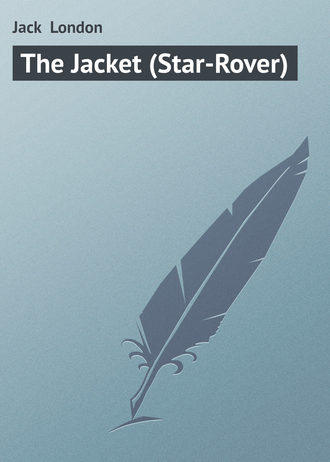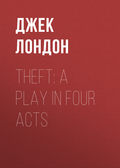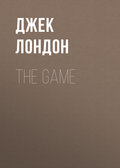
Джек Лондон
The Jacket (Star-Rover)
This I knew: good swordsman as they reckoned me in France, Fortini was a better. This, too, I knew: that I carried my lady’s heart with me this night, and that this night, because of me, there would be one Italian less in the world. I say I knew it. In my mind the issue could not be in doubt. And as our rapiers played I pondered the manner I should kill him. I was not minded for a long contest. Quick and brilliant had always been my way. And further, what of my past gay months of carousal and of singing “Sing cucu, sing cucu, sing cucu,” at ungodly hours, I knew I was not conditioned for a long contest. Quick and brilliant was my decision.
But quick and brilliant was a difficult matter with so consummate a swordsman as Fortini opposed to me. Besides, as luck would have it, Fortini, always the cold one, always the tireless-wristed, always sure and long, as report had it, in going about such business, on this night elected, too, the quick and brilliant.
It was nervous, tingling work, for as surely as I sensed his intention of briefness, just as surely had he sensed mine. I doubt that I could have done the trick had it been broad day instead of moonlight. The dim light aided me. Also was I aided by divining, the moment in advance, what he had in mind. It was the time attack, a common but perilous trick that every novice knows, that has laid on his back many a good man who attempted it, and that is so fraught with danger to the perpetrator that swordsmen are not enamoured of it.
We had been at work barely a minute, when I knew under all his darting, flashing show of offence that Fortini meditated this very time attack. He desired of me a thrust and lunge, not that he might parry it but that he might time it and deflect it by the customary slight turn of the wrist, his rapier point directed to meet me as my body followed in the lunge. A ticklish thing-ay, a ticklish thing in the best of light. Did he deflect a fraction of a second too early, I should be warned and saved. Did he deflect a fraction of a second too late, my thrust would go home to him.
“Quick and brilliant is it?” was my thought. “Very well, my Italian friend, quick and brilliant shall it be, and especially shall it be quick.”
In a way, it was time attack against time attack, but I would fool him on the time by being over-quick. And I was quick. As I said, we had been at work scarcely a minute when it happened. Quick? That thrust and lunge of mine were one. A snap of action it was, an explosion, an instantaneousness. I swear my thrust and lunge were a fraction of a second quicker than any man is supposed to thrust and lunge. I won the fraction of a second. By that fraction of a second too late Fortini attempted to deflect my blade and impale me on his. But it was his blade that was deflected. It flashed past my breast, and I was in-inside his weapon, which extended full length in the empty air behind me-and my blade was inside of him, and through him, heart-high, from right side of him to left side of him and outside of him beyond.
It is a strange thing to do, to spit a live man on a length of steel. I sit here in my cell, and cease from writing a space, while I consider the matter. And I have considered it often, that moonlight night in France of long ago, when I taught the Italian hound quick and brilliant. It was so easy a thing, that perforation of a torso. One would have expected more resistance. There would have been resistance had my rapier point touched bone. As it was, it encountered only the softness of flesh. Still it perforated so easily. I have the sensation of it now, in my hand, my brain, as I write. A woman’s hat-pin could go through a plum pudding not more easily than did my blade go through the Italian. Oh, there was nothing amazing about it at the time to Guillaume de Sainte-Maure, but amazing it is to me, Darrell Standing, as I recollect and ponder it across the centuries. It is easy, most easy, to kill a strong, live, breathing man with so crude a weapon as a piece of steel. Why, men are like soft-shell crabs, so tender, frail, and vulnerable are they.
But to return to the moonlight on the grass. My thrust made home, there was a perceptible pause. Not at once did Fortini fall. Not at once did I withdraw the blade. For a full second we stood in pause-I, with legs spread, and arched and tense, body thrown forward, right arm horizontal and straight out; Fortini, his blade beyond me so far that hilt and hand just rested lightly against my left breast, his body rigid, his eyes open and shining.
So statuesque were we for that second that I swear those about us were not immediately aware of what had happened. Then Fortini gasped and coughed slightly. The rigidity of his pose slackened. The hilt and hand against my breast wavered, then the arm drooped to his side till the rapier point rested on the lawn. By this time Pasquini and de Goncourt had sprung to him and he was sinking into their arms. In faith, it was harder for me to withdraw the steel than to drive it in. His flesh clung about it as if jealous to let it depart. Oh, believe me, it required a distinct physical effort to get clear of what I had done.
But the pang of the withdrawal must have stung him back to life and purpose, for he shook off his friends, straightened himself, and lifted his rapier into position. I, too, took position, marvelling that it was possible I had spitted him heart-high and yet missed any vital spot. Then, and before his friends could catch him, his legs crumpled under him and he went heavily to grass. They laid him on his back, but he was already dead, his face ghastly still under the moon, his right hand still a-clutch of the rapier.
Yes; it is indeed a marvellous easy thing to kill a man.
We saluted his friends and were about to depart, when Felix Pasquini detained me.
“Pardon me,” I said. “Let it be to-morrow.”
“We have but to move a step aside,” he urged, “where the grass is still dry.”
“Let me then wet it for you, Sainte-Maure,” Lanfranc asked of me, eager himself to do for an Italian.
I shook my head.
“Pasquini is mine,” I answered. “He shall be first to-morrow.”
“Are there others?” Lanfranc demanded.
“Ask de Goncourt,” I grinned. “I imagine he is already laying claim to the honour of being the third.”
At this, de Goncourt showed distressed acquiescence. Lanfranc looked inquiry at him, and de Goncourt nodded.
“And after him I doubt not comes the cockerel,” I went on.
And even as I spoke the red-haired Guy de Villehardouin, alone, strode to us across the moonlit grass.
“At least I shall have him,” Lanfranc cried, his voice almost wheedling, so great was his desire.
“Ask him,” I laughed, then turned to Pasquini. “To-morrow,” I said. “Do you name time and place, and I shall be there.”
“The grass is most excellent,” he teased, “the place is most excellent, and I am minded that Fortini has you for company this night.”
“’Twere better he were accompanied by a friend,” I quipped. “And now your pardon, for I must go.”
But he blocked my path.
“Whoever it be,” he said, “let it be now.”
For the first time, with him, my anger began to rise.
“You serve your master well,” I sneered.
“I serve but my pleasure,” was his answer. “Master I have none.”
“Pardon me if I presume to tell you the truth,” I said.
“Which is?” he queried softly.
“That you are a liar, Pasquini, a liar like all Italians.”
He turned immediately to Lanfranc and Bohemond.
“You heard,” he said. “And after that you cannot deny me him.”
They hesitated and looked to me for counsel of my wishes. But Pasquini did not wait.
“And if you still have any scruples,” he hurried on, “then allow me to remove them… thus.”
And he spat in the grass at my feet. Then my anger seized me and was beyond me. The red wrath I call it-an overwhelming, all-mastering desire to kill and destroy. I forgot that Philippa waited for me in the great hall. All I knew was my wrongs-the unpardonable interference in my affairs by the gray old man, the errand of the priest, the insolence of Fortini, the impudence of Villehardouin, and here Pasquini standing in my way and spitting in the grass. I saw red. I thought red. I looked upon all these creatures as rank and noisome growths that must be hewn out of my path, out of the world. As a netted lion may rage against the meshes, so raged I against these creatures. They were all about me. In truth, I was in the trap. The one way out was to cut them down, to crush them into the earth and stamp upon them.
“Very well,” I said, calmly enough, although my passion was such that my frame shook. “You first, Pasquini. And you next, de Goncourt? And at the end, de Villehardouin?”
Each nodded in turn and Pasquini and I prepared to step aside.
“Since you are in haste,” Henry Bohemond proposed to me, “and since there are three of them and three of us, why not settle it at the one time?”
“Yes, yes,” was Lanfranc’s eager cry. “Do you take de Goncourt. De Villehardouin for mine.”
But I waved my good friends back.
“They are here by command,” I explained. “It is I they desire so strongly that by my faith I have caught the contagion of their desire, so that now I want them and will have them for myself.”
I had observed that Pasquini fretted at my delay of speech-making, and I resolved to fret him further.
“You, Pasquini,” I announced, “I shall settle with in short account. I would not that you tarried while Fortini waits your companionship. You, Raoul de Goncourt, I shall punish as you deserve for being in such bad company. You are getting fat and wheezy. I shall take my time with you until your fat melts and your lungs pant and wheeze like leaky bellows. You, de Villehardouin, I have not decided in what manner I shall kill.”
And then I saluted Pasquini, and we were at it. Oh, I was minded to be rarely devilish this night. Quick and brilliant-that was the thing. Nor was I unmindful of that deceptive moonlight. As with Fortini would I settle with him if he dared the time attack. If he did not, and quickly, then I would dare it.
Despite the fret I had put him in, he was cautious. Nevertheless I compelled the play to be rapid, and in the dim light, depending less than usual on sight and more than usual on feel, our blades were in continual touch.
Barely was the first minute of play past when I did the trick. I feigned a slight slip of the foot, and, in the recovery, feigned loss of touch with Pasquini’s blade. He thrust tentatively, and again I feigned, this time making a needlessly wide parry. The consequent exposure of myself was the bait I had purposely dangled to draw him on. And draw him on I did. Like a flash he took advantage of what he deemed an involuntary exposure. Straight and true was his thrust, and all his will and body were heartily in the weight of the lunge he made. And all had been feigned on my part and I was ready for him. Just lightly did my steel meet his as our blades slithered. And just firmly enough and no more did my wrist twist and deflect his blade on my basket hilt. Oh, such a slight deflection, a matter of inches, just barely sufficient to send his point past me so that it pierced a fold of my satin doublet in passing. Of course, his body followed his rapier in the lunge, while, heart-high, right side, my rapier point met his body. And my outstretched arm was stiff and straight as the steel into which it elongated, and behind the arm and the steel my body was braced and solid.
Heart-high, I say, my rapier entered Pasquini’s side on the right, but it did not emerge, on the left, for, well-nigh through him, it met a rib (oh, man-killing is butcher’s work!) with such a will that the forcing overbalanced him, so that he fell part backward and part sidewise to the ground. And even as he fell, and ere he struck, with jerk and wrench I cleared my weapon of him.
De Goncourt was to him, but he waved de Goncourt to attend on me. Not so swiftly as Fortini did Pasquini pass. He coughed and spat, and, helped by de Villehardouin, propped his elbow under him, rested his head on hand, and coughed and spat again.
“A pleasant journey, Pasquini,” I laughed to him in my red anger. “Pray hasten, for the grass where you lie is become suddenly wet and if you linger you will catch your death of cold.”
When I made immediately to begin with de Goncourt, Bohemond protested that I should rest a space.
“Nay,” I said. “I have not properly warmed up.” And to de Goncourt, “Now will we have you dance and wheeze-Salute!”
De Goncourt’s heart was not in the work. It was patent that he fought under the compulsion of command. His play was old-fashioned, as any middle-aged man’s is apt to be, but he was not an indifferent swordsman. He was cool, determined, dogged. But he was not brilliant, and he was oppressed with foreknowledge of defeat. A score of times, by quick and brilliant, he was mine. But I refrained. I have said that I was devilish-minded. Indeed I was. I wore him down. I backed him away from the moon so that he could see little of me because I fought in my own shadow. And while I wore him down until he began to wheeze as I had predicted, Pasquini, head on hand and watching, coughed and spat out his life.
“Now, de Goncourt,” I announced finally. “You see I have you quite helpless. You are mine in any of a dozen ways. Be ready, brace yourself, for this is the way I will.”
And, so saying, I merely went from carte to tierce, and as he recovered wildly and parried widely I returned to carte, took the opening, and drove home heart-high and through and through. And at sight of the conclusion Pasquini let go his hold on life, buried his face in the grass, quivered a moment, and lay still.
“Your master will be four servants short this night,” I assured de Villehardouin, in the moment just ere we engaged.
And such an engagement! The boy was ridiculous. In what bucolic school of fence he had been taught was beyond imagining. He was downright clownish. “Short work and simple” was my judgment, while his red hair seemed a-bristle with very rage and while he pressed me like a madman.
Alas! It was his clownishness that undid me. When I had played with him and laughed at him for a handful of seconds for the clumsy boor he was, he became so angered that he forgot the worse than little fence he knew. With an arm-wide sweep of his rapier, as though it bore heft and a cutting edge, he whistled it through the air and rapped it down on my crown. I was in amaze. Never had so absurd a thing happened to me. He was wide open, and I could have run him through forthright. But, as I said, I was in amaze, and the next I knew was the pang of the entering steel as this clumsy provincial ran me through and charged forward, bull-like, till his hilt bruised my side and I was borne backward.
As I fell I could see the concern on the faces of Lanfranc and Bohemond and the glut of satisfaction in the face of de Villehardouin as he pressed me.
I was falling, but I never reached the grass. Came a blurr of flashing lights, a thunder in my ears, a darkness, a glimmering of dim light slowly dawning, a wrenching, racking pain beyond all describing, and then I heard the voice of one who said:
“I can’t feel anything.”
I knew the voice. It was Warden Atherton’s. And I knew myself for Darrell Standing, just returned across the centuries to the jacket hell of San Quentin. And I knew the touch of finger-tips on my neck was Warden Atherton’s. And I knew the finger-tips that displaced his were Doctor Jackson’s. And it was Doctor Jackson’s voice that said:
“You don’t know how to take a man’s pulse from the neck. There-right there-put your fingers where mine are. D’ye get it? Ah, I thought so. Heart weak, but steady as a chronometer.”
“It’s only twenty-four hours,” Captain Jamie said, “and he was never in like condition before.”
“Putting it on, that’s what he’s doing, and you can stack on that,” Al Hutchins, the head trusty, interjected.
“I don’t know,” Captain Jamie insisted. “When a man’s pulse is that low it takes an expert to find it-”
“Aw, I served my apprenticeship in the jacket,” Al Hutchins sneered. “And I’ve made you unlace me, Captain, when you thought I was croaking, and it was all I could do to keep from snickering in your face.”
“What do you think, Doc?” Warden Atherton asked.
“I tell you the heart action is splendid,” was the answer. “Of course it is weak. That is only to be expected. I tell you Hutchins is right. The man is feigning.”
With his thumb he turned up one of my eyelids, whereat I opened my other eye and gazed up at the group bending over me.
“What did I tell you?” was Doctor Jackson’s cry of triumph.
And then, although it seemed the effort must crack my face, I summoned all the will of me and smiled.
They held water to my lips, and I drank greedily. It must be remembered that all this while I lay helpless on my back, my arms pinioned along with my body inside the jacket. When they offered me food-dry prison bread-I shook my head. I closed my eyes in advertisement that I was tired of their presence. The pain of my partial resuscitation was unbearable. I could feel my body coming to life. Down the cords of my neck and into my patch of chest over the heart darting pains were making their way. And in my brain the memory was strong that Philippa waited me in the big hall, and I was desirous to escape away back to the half a day and half a night I had just lived in old France.
So it was, even as they stood about me, that I strove to eliminate the live portion of my body from my consciousness. I was in haste to depart, but Warden Atherton’s voice held me back.
“Is there anything you want to complain about?” he asked.
Now I had but one fear, namely, that they would unlace me; so that it must be understood that my reply was not uttered in braggadocio but was meant to forestall any possible unlacing.
“You might make the jacket a little tighter,” I whispered. “It’s too loose for comfort. I get lost in it. Hutchins is stupid. He is also a fool. He doesn’t know the first thing about lacing the jacket. Warden, you ought to put him in charge of the loom-room. He is a more profound master of inefficiency than the present incumbent, who is merely stupid without being a fool as well. Now get out, all of you, unless you can think of worse to do to me. In which case, by all means remain. I invite you heartily to remain, if you think in your feeble imaginings that you have devised fresh torture for me.”
“He’s a wooz, a true-blue, dyed-in-the-wool wooz,” Doctor Jackson chanted, with the medico’s delight in a novelty.
“Standing, you are a wonder,” the Warden said. “You’ve got an iron will, but I’ll break it as sure as God made little apples.”
“And you’ve the heart of a rabbit,” I retorted. “One-tenth the jacketing I have received in San Quentin would have squeezed your rabbit heart out of your long ears.”
Oh, it was a touch, that, for the Warden did have unusual ears. They would have interested Lombroso, I am sure.
“As for me,” I went on, “I laugh at you, and I wish no worse fate to the loom-room than that you should take charge of it yourself. Why, you’ve got me down and worked your wickedness on me, and still I live and laugh in your face. Inefficient? You can’t even kill me. Inefficient? You couldn’t kill a cornered rat with a stick of dynamite-real dynamite, and not the sort you are deluded into believing I have hidden away.”
“Anything more?” he demanded, when I had ceased from my diatribe.
And into my mind flashed what I had told Fortini when he pressed his insolence on me.
“Begone, you prison cur,” I said. “Take your yapping from my door.”
It must have been a terrible thing for a man of Warden Atherton’s stripe to be thus bearded by a helpless prisoner. His face whitened with rage and his voice shook as he threatened:
“By God, Standing, I’ll do for you yet.”
“There is only one thing you can do,” I said. “You can tighten this distressingly loose jacket. If you won’t, then get out. And I don’t care if you fail to come back for a week or for the whole ten days.”
And what can even the Warden of a great prison do in reprisal on a prisoner upon whom the ultimate reprisal has already been wreaked? It may be that Warden Atherton thought of some possible threat, for he began to speak. But my voice had strengthened with the exercise, and I began to sing, “Sing cucu, sing cucu, sing cucu.” And sing I did until my door clanged and the bolts and locks squeaked and grated fast.







